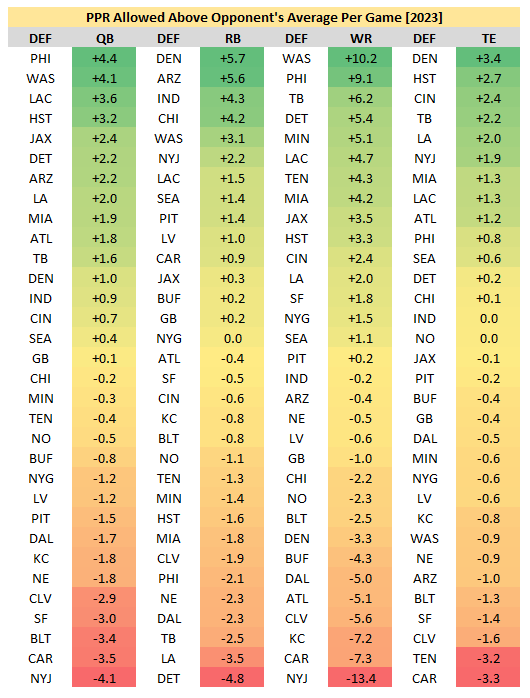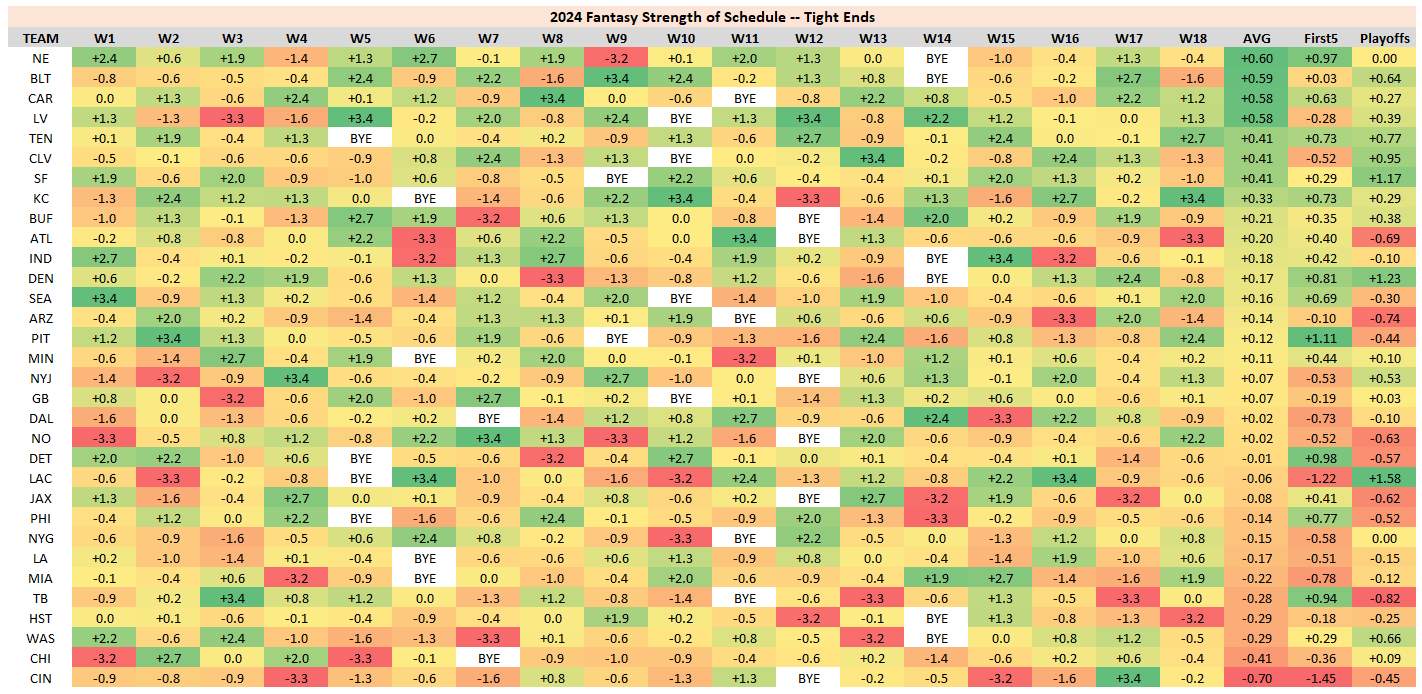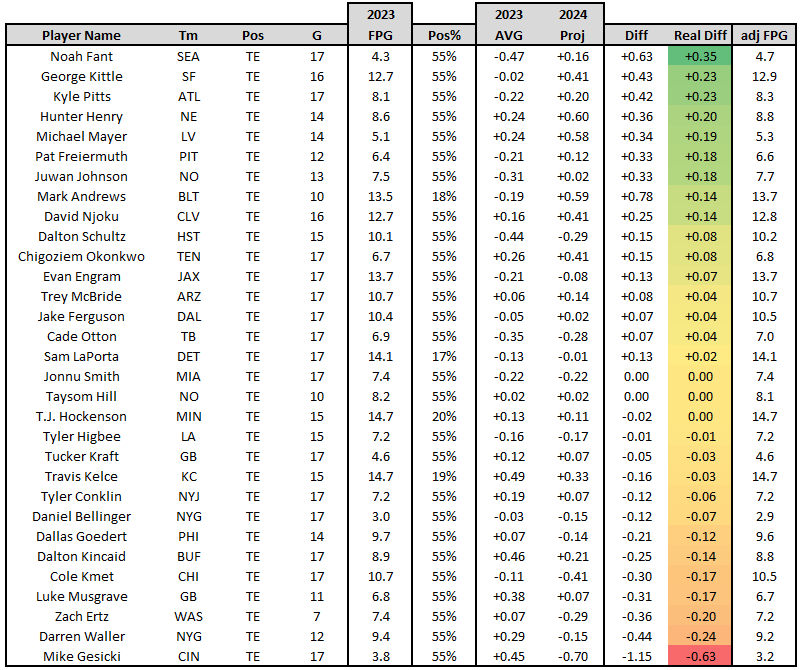Stay ahead in your fantasy football league by understanding the crucial strength of schedule changes that could alter player performance at the tight end position!
Which tight ends have the toughest or easiest fantasy schedules this year? Which tight ends had the toughest or easiest schedules last year? Or what about the toughest or easiest schedules in the fantasy postseason? Or to start the season? Which tight ends saw their schedules improve the most or least? How big of an impact was that change in schedule? Can we quantify that change in real terms using fantasy points?
Luckily for our subscribers, we can answer all of these questions and more. But in order to do so, we first had to quantify strength of schedule. This is typically done by calculating a defense’s FPG allowed average, and then looking at the average for all players over a full season. This will also be our approach; however, we’ll be taking things one step further — we’re going to use a control for the opposing offense by measuring FPG over an opponent’s average.
For instance, last season, opposing tight ends averaged +4.1 fantasy points per game over their season-long average when facing the Cardinals, which ranked worst in the league. (The Cardinals were the most favorable fantasy matchup for opposing tight ends — worth, on average, an additional 4.1 fantasy points per game.) On the opposite end of the spectrum, tight ends fell short of their season-long average by 4.3 fantasy points when facing the Saints, which ranked best in the league. (The Saints were the toughest fantasy matchup for opposing tight ends.) Calculating these numbers for all teams and then applying the full-season average for all players quantifies in real terms which players had the easiest and most difficult schedules for fantasy last year. We can also use these numbers to project out strength of schedule for each team and each position in 2024.
Ah, then, you might ask: “Do defenses get defined as ‘tough’ matchups because bad TE play against them is dragging the numbers down?” Not for this study. The strength of schedule average used in this study controls for the quality of the opponent by eliminating a team’s own TE performance against each specific defense. So, this SOS study filters out the notion that the TE being studied was responsible for his own schedule difficulty.
While this methodology isn’t perfect — of course, roster turnover and coaching changes will complicate things — strength of schedule doesn’t not matter. This data is still far more actionable than it is not. In fantasy football — like in poker — there may only be small edges to be gained, but those small edges can be compounded to yield a massive advantage. And they must be taken advantage of … and are, by the most dominant players. That’s the case with strength of schedule. It’s another small edge to be realized, and at the polar extremes, it might matter a lot more than you’d expect.
Other Positions
Quarterbacks (click here)
Running Backs (click here)
Wide Receivers (click here)
Best Overall Schedule (2023)
1. Travis Kelce, Average Matchup: +0.49
2. Dalton Kincaid (+0.46)
3. Mike Gesicki (+0.45)
4. Luke Musgrave (+0.38)
5. Darren Waller (+0.29)
Worst Overall Schedule (2023)
1. Noah Fant (-0.47)
2. Dalton Schultz (-0.44)
3. Irv Smith (-0.37)
4. Cade Otton (-0.35)
5. Juwan Johnson (-0.31)
2024 Schedule
PDF and CSV downloads available here.
Best Overall Schedule (Weeks 1-17)
1. Hunter Henry (+0.60)
2. Mark Andrews (+0.59)
3. Ja’Tavion Sanders (+0.58)
4. Brock Bowers / Michael Mayer (+0.58)
5. Chig Okonkwo (+0.41)
Worst Overall Schedule (Weeks 1-17)
1. Mike Gesicki (-0.70)
2. Cole Kmet (-0.41)
t3. Ben Sinnott / Zach Ertz (-0.29)
t3. Dalton Schultz (-0.29)
5. Cade Otton (-0.28)
Off to a Hot Start (First Five Games)
1. Pat Freiermuth (+1.11)
2. Sam LaPorta (+0.98)
3. Hunter Henry (+0.97)
4. Cade Otton (+0.94)
5. Greg Dulcich (+0.81)
Slow Starters (First Five Games)
1. Mike Gesicki (-1.45)
2. Donald Parham / Will Dissly (-1.22)
3. Jonnu Smith (-0.78)
4. Jake Ferguson (-0.73)
5. Darren Waller / Theo Johnson (-0.58)
Best Playoff Schedule (Weeks 15-17)
1. Donald Parham / Will Dissly (+1.58)
2. Greg Dulcich (+1.23)
3. George Kittle (+1.17)
4. David Njoku (+0.95)
5. Chig Okonkwo (+0.77)
Worst Playoff Schedule (Weeks 15-17)
1. Cade Otton (-0.82)
2. Trey McBride (-0.74)
3. Kyle Pitts (-0.69)
4. Juwan Johnson (-0.63)
5. Evan Engram (-0.62)
Schedule Change (In Real Points)
Most Improved Schedule
1. Noah Fant (+0.35)
t2. George Kittle (+0.23)
t2. Kyle Pitts (+0.23)
4. Hunter Henry (+0.20)
5. Michael Mayer (+0.19)
Least Improved Schedule
1. Mike Gesicki (-0.63)
2. Darren Waller (-0.24)
3. Zach Ertz (-0.20)
4. Luke Musgrave (-0.17)
5. Cole Kmet (-0.17)
Notes
For full transparency, strength of schedule is simply less important for tight ends than for any of the other positions we’ve looked at. This is also true from a weekly (DFS) perspective as well — matchups only really matter for TEs at the polar extremes. So, unfortunately, a broad full-season look doesn’t offer much predictive value at this position. And perhaps that’s obvious from the above chart. Noah Fant benefits the most of any TE from his 2024 schedule. But Fant is barely fantasy relevant, and his position-high +0.35 boost pales in comparison to the top QB (+0.90), RB (+0.78), or WR (+1.02) we’ve already discussed.










